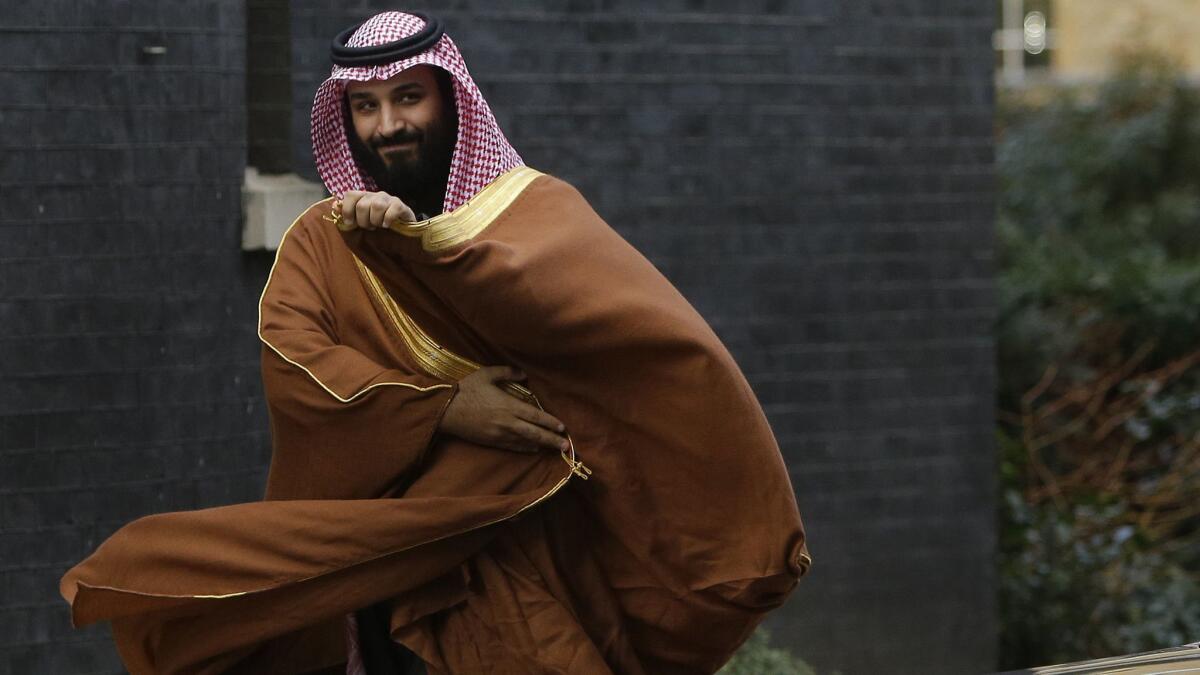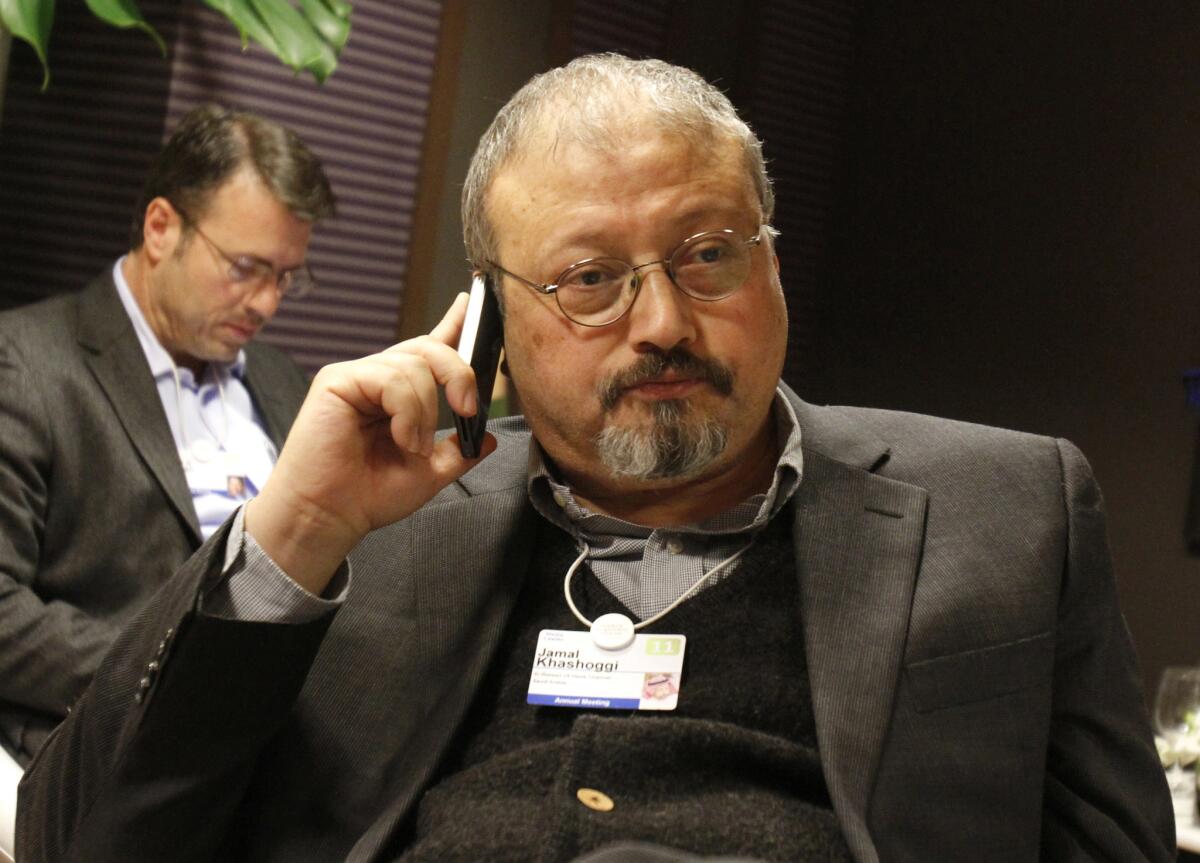An oil war and coronavirus rattle the Saudi crown prince’s dangerous game of thrones
BEIRUT — This was to be a bumper year for Saudi Arabia.
Billions of dollars’ worth of megaprojects, marquee events and hosting the Group of 20 signaled that a once-sealed kingdom was opening its doors to the world. The mood was so heady that Mohammed bin Salman, Saudi Arabia’s crown prince and de facto ruler, made the upbeat prediction that by this year “we’ll be able to live without oil.”
Instead he has entered into a full-fledged oil price war with Russia amid a coronavirus pandemic and what appears to be a battle for succession. All have put the grand visions of an impulsive, brazen 34-year-old scion at risk. Despite the scandals that have beset Mohammed — the killing of Saudi journalist Jamal Khashoggi, the war in Yemen, human rights — he has continued to operate with the unwavering support of President Trump.
But the prince now faces new adversaries. And arresting palace royals, dispatching armies and hacking Amazon tycoon Jeff Bezos’ phone, which the prince has been accused of, won’t make the coronavirus subject to the whims of a desert ruler. The outbreak and other gathering problems raise the stakes for a prince whose strategies and gambits have estranged many allies who once praised him as a reformer.
Since his father, King Salman, ascended the throne in 2015, the prince has all but commandeered the reins of the nation, swatting other royals aside to take control of Saudi Arabia’s domestic and foreign policy as well as its defense. At the heart of his bid for power is Vision 2030, a wide-ranging, often fantastical plan to transform the deeply conservative kingdom into a modern-day Shangri-La with no need for oil.
But a growing fracas this week between the Organization for Petroleum Exporting Countries and Russia over output levels — Moscow has refused OPEC’s request to cut supply as the global demand for oil deflates — triggered a countermove by Saudi Arabia. The country, an OPEC power, ordered an increase in production from 12 million barrels a day to 13 million — a move that put pressure on Moscow.
The tactic to lower oil prices, said David Ottaway, a Middle East fellow at the Wilson Center, was in keeping with the prince’s character: Mohammed “didn’t create this crisis, but he had to figure out what to do, and he’s taken the riskiest option.”
The announcement by the world’s biggest crude oil exporter did nothing to calm markets already ravaged by the coronavirus. Oil prices plunged more than 6%, building on losses that had culled more than a quarter of the price in the days before, with Brent crude selling at $36 on Thursday.
It was the opening play in what analysts described as a game of “chicken” between Saudi Arabia and its Persian Gulf allies against Russia. In many ways, though, it could hurt the kingdom as well: The Saudi government needs to sell oil at more than twice that $36 price to break even. The move also threatened the Saudi oil company Aramco; its stock — in which many Saudis invested their savings at the government’s urging — crashed to levels below its initial public offering.

The result, said Karen Young, a Middle East scholar at the American Enterprise Institute, would be a doubling of the country’s deficit for this year, along with a “huge contraction” in government spending and investments in Saudi Arabia’s fledgling non-oil private sector.
And it comes as the coronavirus outbreak has disrupted events and festivals meant to showcase Saudi Arabia as a new travel destination. If the crisis persists, it puts not only the G-20 summit but also the annual hajj pilgrimage and other religious tourism in jeopardy — a loss of an estimated 10 million visitors, based on Saudi government figures on pilgrims for 2019.
“The Saudis and MBS are making a gamble for increased market share,” Young said in a phone interview, referring to the crown prince by his initials. Assuming oil prices would rebound by next year as China comes back online after the virus crisis, she added, Saudi Arabia would take the hit now in exchange for a big payoff next year.
“But the second view is that the shock we’re seeing now will be damaging for a long time, that China won’t be so quick to rebound and that perhaps we’re headed for a global recession.”
Either way, it was a gamble by an impertinent — some would argue reckless — prince who has shown ruthlessness in dealing with dissent both at home and abroad.
He launched a war in Yemen in a bid, he said, to stand up to Iran, but the conflict became the world’s worst humanitarian crisis. He was lauded for defanging the country’s notorious religious police, allowing women to drive and dismantling the female guardianship system; yet he jailed the activists who had fought hardest for that change in a kingdom ruled by the strict Wahhabi sect of Islam.

The prince launched an anti-corruption drive, but it involved what critics said were mafia-like shakedowns of politicians, officials and members of the royal family. That was followed by the 2018 killing and dismemberment of Saudi journalist Khashoggi, widely blamed on Mohammed, which derailed his relationship with U.S. congressional leaders and turned the CIA against him, even as the White House maintained his defense.
That boldness was on display again last week, when rumors surfaced the prince had arrested senior members of the royal family, including King Salman’s brother, Prince Ahmed bin Abdulaziz, and Prince Mohammed bin Nayef.
Though there was no confirmation from the Saudi government, they were notable targets. Both princes could have claims to the throne when the 84-year-old Salman passes away. But it seemed another case of overreach, if only because Mohammed bin Salman had already sidelined his uncle years ago and put Mohammed bin Nayef, a onetime favorite of the U.S. and a former crown prince himself, under house arrest in 2017.
Though they posed little threat in terms of engineering a coup (a possible explanation of the arrests that many have since dismissed), both are thought to have opposed Mohammed’s consolidation of power. Prince Ahmed is also a member of the Allegiance Council, the body ostensibly tasked with selecting the king’s successor. He was said to be one of three dissenting voices on the vote to appoint Mohammed as crown prince in 2017.
With his father’s health deteriorating, analysts say, Mohammed could be mobilizing to transfer power to himself while Salman is alive. To do that, said Iyad Baghdadi, head of the Kawaakibi Foundation and an online activist targeted by the kingdom, he would need the approval of the Allegiance Council.
“He needs to stack it with loyalists and weed out anyone who could block his move, hence the arrests,” Baghdadi said. He added the prince needed to take action now so as to ascend the throne before the G-20 summit and U.S. elections in November.
Such a move would mark a major shift in how power is transferred in Saudi Arabia. Since 1953, succession has moved horizontally among the sons of Saudi Arabia’s founder, Abdulaziz ibn Saud. But shaking up established orders has been the strategy of a crown prince many view as pugnacious and polarizing.
“We’ve come to know him as impulsive, headstrong, and unpredictable,” Ottaway said.
“And he’s proven that’s what he is.”
More to Read
Sign up for Essential California
The most important California stories and recommendations in your inbox every morning.
You may occasionally receive promotional content from the Los Angeles Times.











